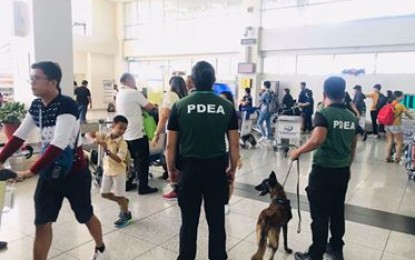
GAINING GROUND. Philippine Drug Enforcement Agency (PDEA) officers conduct inspections at the Iloilo International Airport in Cabatuan, Iloilo. PDEA said its anti-drug campaign in Western Visayas is gaining ground, with 74.5 percent of the barangays in the region already declared as drug-cleared. (Photo courtesy of PDEA 6)
ILOILO CITY -- The fight against illegal drugs in Western Visayas is not solely the responsibility of law enforcers but involves all sectors of the society.
The Philippine Drug Enforcement Agency (PDEA), which has been leading the campaign in Western Visayas, believes that its positive outcome in the region is “not solely due to anti-drug operations” but also the region's holistic approach", officer-in-charge Alex M. Tablate said.
Aside from drug-clearing operations, efforts to curb the drug problem include the establishment of Balay Silangan Reformation Center, and community-based rehabilitation, among others.
“When it comes to drugs, it is not just PDEA, PNP (Philippine National Police) and other law enforcement agencies but the participation of other government agencies, stakeholders, support of local government and community is very important and crucial,” he said.
Tablate said barangay drug-clearing includes all efforts: pre-operation, operation, and post-operation. The challenging anti-drug-operation, which includes the PNP’s Tokhang, falls under the operation phase.
“Together with PNP, we implemented Tokhang. This is actually giving second chances to those who would like to be reformed," he said, adding that this is the “soft touch” approach but those who refuse to heed are engaged through actual anti-drug operations.
Tablate also underscored the role of the community, especially the barangays that work at the forefront; national government agencies; and even families.
From January 1 to December 19, the Police Regional Office (PRO) 6 (Western Visayas) recorded 255 surrenderers who used drugs and arrested 2,584 individuals from 1,849 operations conducted.
To achieve its target of declaring the region as drug-cleared by 2022, PDEA embarked on the full implementation of its drug-clearing program and the establishment of the Balay Silangan Program in Western Visayas.
Balay Silangan is a national drug reformation program that offers temporary refuge to drug offenders, particularly pusher-surrenderers.
Meanwhile, the municipalities of Bingawan, Miagao, Igbaras, Guimbal, Dingle and Passi City have been declared as drug-cleared due to police operations.
Moreover, 74.52 percent or 3,018 of the 4,051 barangays in Western Visayas have been declared as cleared of illegal drugs.
Aklan has 297 barangays cleared out of 327 barangays; Antique, 580 out of 590; Capiz, 305 out of 473; Guimaras, 74 out of 98; Iloilo province, 1,523 out of 1,721; Negros Occidental, 170 out of 601; Bacolod City, 8 out of 61; and Iloilo City, 61 out of 180.
Shey Tanaleon, PDEA spokesperson for Western Visayas, said barangays that have yet to be declared as drug-cleared are either seriously or moderately affected barangays, meaning there could be presence of pushers, drug dens or drug laboratories and plantation.
She added that drug-clearing has also been extended to the Bureau of Jail Management and Penology (BJMP) facilities. From January to December, the BJMP had 25 out of 34 jails in Region 6 declared as cleared.
The parameters were almost similar to the barangay drug-clearing, such as there is no presence of users, no recoveries during greyhound operations, activities were available for persons deprived of liberty (PDL), and no PDL is positive from illegal drugs.
Meanwhile, two Balay Silangan Reformation Centers are already operational in Western Visayas. These are in Passi City, Iloilo and Tapaz, Capiz. The centers already produced more than 50 graduates.
Aside from the Balay Silangan, local government units as per regulation of the Dangerous Drugs Board (DDB) are mandated to establish a community-based rehabilitation program for those who chose to reshape the quality of their life.
“It has to be institutionalized at all levels of government, may it be city, municipality or barangay so that any moment that a drug surrenderer appears, then they are ready to extend the needed service,” said John Richard Lapascua, senior health officer of the Department of Health (DOH) 6 and member of the regional oversight committee.
DOH data showed that as of August, out of the 2, 067 drug surrenderers in Aklan, 1,457 were enrolled in appropriate community-based rehabilitation centers.
In Antique, 703 out of its 1,602 surrenderers were enrolled over the same period; 3,203 out of 5,270 in Capiz; none in Guimaras and Iloilo City; 1,080 out of 2,377 in Iloilo province; 184 out of 3,135 in Negros Occidental; and 145 out of 3,981 in Bacolod City.
“Based on health perspective to address the addiction, we can see that there is an appropriate service given to People Who Use Drugs (PWUD). Based on data, the rehabilitation effort is continuous and hopefully, it will be sustained,” Lapascua said. (PNA)
